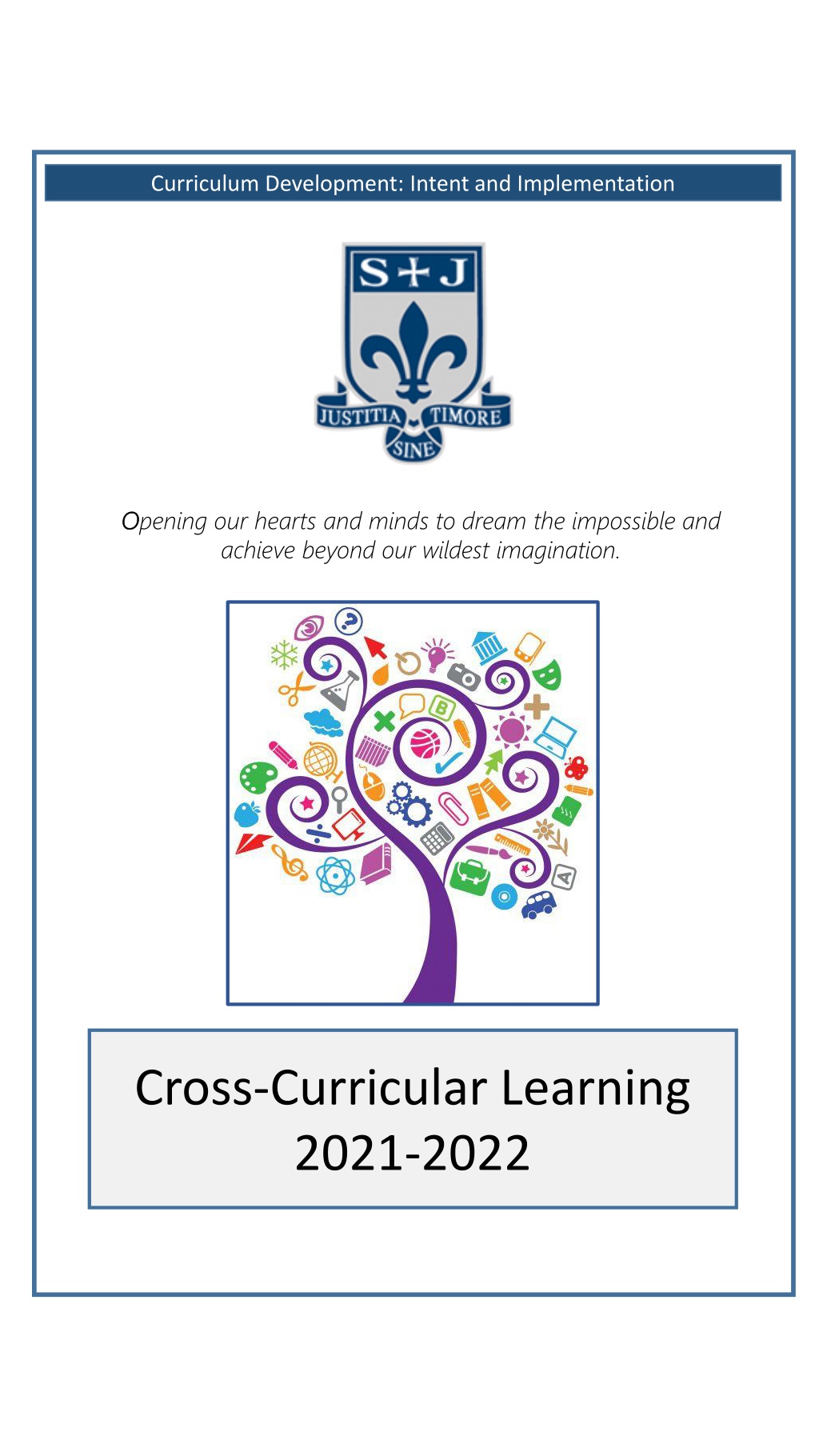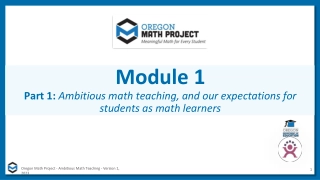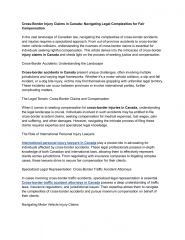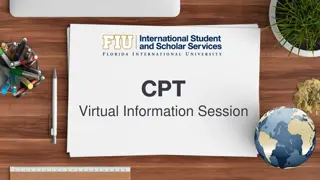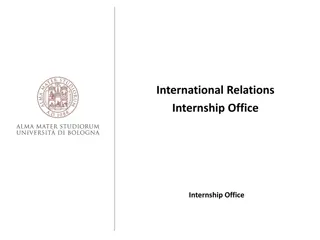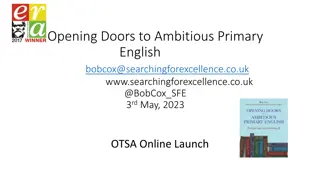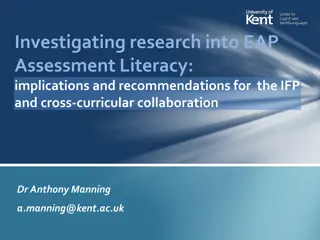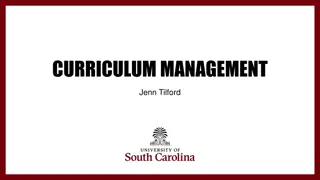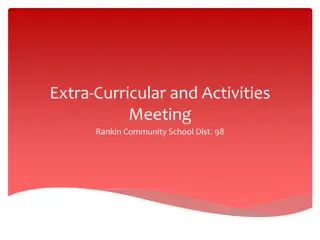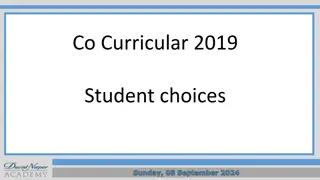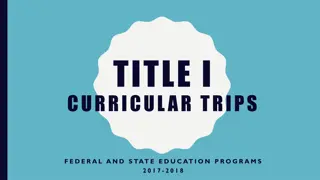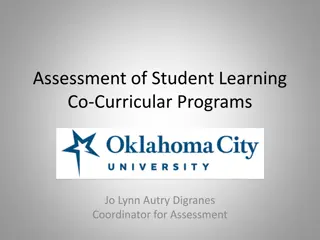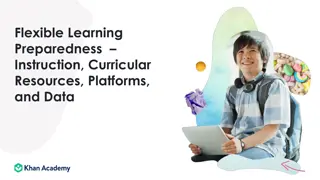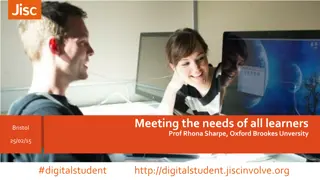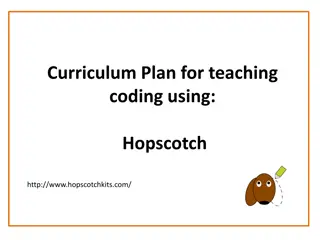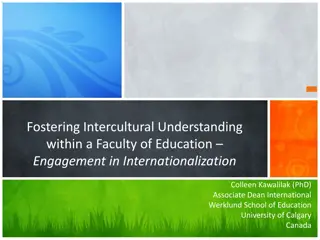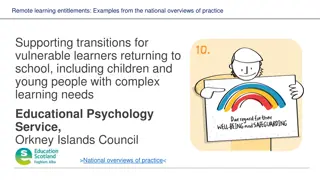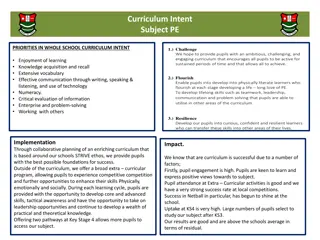Fostering Cross-Curricular Learning for Ambitious Young Learners
Delve into the world of cross-curricular learning at St. Joseph's, where the intent is to nurture ambition and aspiration in students through an interconnected and transdisciplinary curriculum. By weaving together various subjects, this approach not only sparks imagination but also enhances students' understanding, skills, and motivation. Discover the benefits, strategies, and collaborative efforts that make cross-curricular learning a cornerstone of educational excellence.
Download Presentation

Please find below an Image/Link to download the presentation.
The content on the website is provided AS IS for your information and personal use only. It may not be sold, licensed, or shared on other websites without obtaining consent from the author. Download presentation by click this link. If you encounter any issues during the download, it is possible that the publisher has removed the file from their server.
E N D
Presentation Transcript
Curriculum Development: Intent and Implementation O Opening our hearts and minds to dream the impossible and achieve beyond our wildest imagination. Cross-Curricular Learning 2021-2022
Curriculum Development: Cross-Curricular Learning St Joseph s Curriculum Implementation Cross-Curricular Learning As our curriculum intent states we aim to instil ambition in our young, with a curriculum that is aspirational in a bespoke way to meet the needs of learners. The world beyond the classroom is cross-curricular, therefore we have a duty to ensure that our curriculum is transdisciplinary, interleaving and clearly sequenced. Cross-curricular learning involves establishing patterns of information between different academic subjects. It offers a creative way of developing knowledge, understanding and practical skills through a study of interconnected topics. A common way of expanding knowledge on a specific subject is to study the history of that topic and apply that learning to other teaching lessons. Benefits for Students Cross-curricular learning allows for more inter-connected lessons that capture your students' imagination. It also enables them to identify patterns of information between subjects that will help to enforce key knowledge. Good cross-curricular learning can involve a wide variety of different subjects, but it more usually relies upon links between only a couple of key subjects. Making sure the links between lessons are natural and not forced is key to a successful cross-curricular learning strategy. Cross-curricular work offers a creative way to develop children's knowledge, skills and understanding while motivating them to learn through stimulating, interconnected topics. A study which crosses subject boundaries allows for investigations that engage children's imagination. It also gives teachers opportunities to encourage active enquiry, taking the initiative, and discussion and debate by children. Curriculum connections make learning more meaningful for students. When students see the connections between individual subject areas, the material becomes more relevant.
Curriculum Development: Cross-Curricular Learning Cross-Curricular Learning Departments across the curriculum have worked collaboratively to identify areas of common content and skill, together with when these are delivered to students in the 5-year curriculum so that they can taught in collaboration and using the same techniques and vocabulary. Year 7 Year 8 Year 9 Year 10 Year 11 This is shown in two ways, below and on the following page. Literacy Skills Numeracy Skills RSE Citizenship H&S Skills Plot, interpret and compare graphs including lines of best fit Research unfamiliar words with dictionary/thesaurus Understanding straight line graphs and proportion Use spelling, punctuation and grammar correctly Significant figures, standard form and accuracy Select and retrieve information from text Present logical and sequenced responses Calculate areas and volumes of shapes Use evidence to support an argument Use prefixes and orders of magnitude Collection and interpretation of data Determine and plan to reduce risks Write using appropriate vocabulary Explore how characters are created Online and Media/Internet Safety Study historical texts and writing Fractions, percentages and ratios Intimate and sexual relationships Carry out safe practical work Outline an ethical argument Analyse a task and products Judge reliability of evidence Drugs, Alcohol and Tabacco Convert between measures Physical Health and Fitness Draw and interpret graphs Solving linear equations Equations and formulae Statistics and Sampling Health and Prevention Develop listening skills Studying a fiction text Develop writing skills Studying a play script Provide an opinion Graphs of Motion Mental Wellbeing Use of the Media Calculate a mean Healthy Eating Data Handling Relationships Citizenship Being Safe First Aid Families Art English Drama Geography History ICT Maths MFL Music PE RE Science Technology Food Tech Enrichment Shared Content Healthy Eating and Nutritional Information Human Rights and Inequality of the World History of different countries and cultures History of Development of the Church Historical Events and their influence Geographical Places of importance Global and Environmental Issues Importance of Historical Figures Asylum Seekers and Refugees World War I and World War II Performing with Confidence Sustainable Development Erosion and Weathering Evaluate Practical work Properties of Materials Using a range of media Development of Drugs Theories of Creation Disease and Illnesses Fertility Treatments Health and Fitness Effects of Exercise Use ICT for design Structure of Earth Drugs and Alcohol Energy Resources The Human Body History of Britain Material Choices Lever and Gears Contraception Causes of War Uses of X-rays Animal Rights Online Safety Clean Water Stewardship Transplants Ecosystems LEDCs /LICs Evolution Fairtrade Weather Art English Drama Geography History ICT Maths MFL Music PE RE Science Technology Food Tech
Curriculum Development: Cross-Curricular Learning St Joseph s Curriculum Implementation Cross-Curricular Learning Other areas of the curriculum are multi-disciplinary such as Literacy, RSE, SMSC, Fundamental British Values, Citizenship and PSHEE. Literacy Literacy is fundamental to all areas of learning as it unlocks access to the wider curriculum. A literate individual is granted greater life opportunities because they have built a foundation for lifelong learning and employment; this strongly contributes to the development of all aspects of social and academic life. A whole school curriculum approach to Literacy is detailed in the whole school Curriculum Guide on the school website. Each departmental approach to the delivery of Literacy is found in the individual department curriculum guides, also on the school website. Relationship and Sex Education (RSE) Today s children and young people are growing up in an increasingly complex world and living their lives seamlessly on and offline. This presents many positive and exciting opportunities, but also challenges and risks. In this environment, children and young people need to know how to be safe and healthy, and how to manage their academic, personal and social lives in a positive way. Therefore updated statutory guidance was issued for implementation by 2021. The statutory curriculum is delivered across the RE and Science subject curriculums, Curriculum Enrichment Days and our assembly calendar. The topics and subject content has been mapped across each days and this mapping can be found on the curriculum area of the school website. SMSC and Fundamental British Values Spiritual, Moral, Social and Cultural (SMSC) development is the over-arching umbrella that encompasses personal development across the whole curriculum. Fundamental British Values are promoted in school to ensure young people leave school prepared for life in modern Britain. This ensures that children become valuable and fully rounded members of society who treat others with respect and tolerance, regardless of background. A whole school curriculum approach to these are detailed in the whole school Curriculum Guide on the school website. Each departmental approach to the delivery of these key areas is found in the individual department curriculum guides, also on the school website. Citizenship/PSHEE Citizenship education involves developing the knowledge, skills and confidence to enable people to make their own decisions and to take responsibility for their own lives and communities. Personal, social, health and economic education (PSHEE) is an important and necessary part of all pupils education. The topics and subject information for an statutory content has been mapped across the school curriculum, particularly the school s Curriculum Enrichment Days and this mapping can be found on the curriculum area of the school website.
Curriculum Development: Cross-Curricular Learning St Joseph s Curriculum Implementation Curriculum Enrichment Days Young people are subject to many pressures and influences today relating to moral and social issues often presented to them in magazines and newspapers, through social media, the internet and of course television. Schools have a responsibility to prepare our young people for the challenges of growing up with a real understanding of the rights and responsibilities that accompany individual freedom and choice. We are bound by the government s requirement to teach Citizenship, Personal, Social, Health and Economic Education (PSHEE). As a Catholic school, we always endeavour to set these moral and social issues in the context of the teachings of Jesus Christ and the vision of the Catholic Church. As a school, we have approach these topics on a series of Curriculum Enrichment Days, on which every student will be off timetable and taking part in a carousel of activities. These Curriculum Enrichment days are designed to enhance and enrich our student curriculum and provide opportunities for students to build key skills such as leadership, communication and teamwork as well as contribute to developing students character through the RSE, Citizenship and PSHEE curriculum. CEIAG is also central to the activities that are taught on these days. The themes, the schemes of work, and the teaching and learning materials have been developed in line with our PSHEE and Relationships and Sex Education policies. Staff work together to deliver moral and social messages in the context that we are all made in the image and likeness of God , and that we are all unique and precious in God s eyes. Benefits for Students Students feedback from Curriculum Enrichment Days is always positive and demonstrates the importance and impact that these days have on the students wellbeing and personal development. Students appreciate the opportunity to discuss and explore a range of topics beyond a typical curriculum day in school.
Curriculum Development: Cross-Curricular Learning St Joseph s Curriculum Implementation Cross-Curricular Learning A long-term curriculum aspiration to support the implementation of our curriculum intent is to provide staff and students with the skills and experience to cover a range of cross-curricular skills and content in their daily teaching practice as is common practice with Literacy, SMSC and other wider curriculum areas. As we build these skills and expertise, and as part of our commitment to developing our students and providing them with a deep and enriching curriculum, we have developed three Lifelong learning days. These days support our young people to dream the impossible and achieve beyond their wildest imagination . The Lifelong learning days are three calendared days to boost the independent learning skills of our students, develop their resilience, love of learning and understanding of themselves. It also offers our students a variety of learning experiences beyond their curriculum subjects. The students cover a range of different topics to gain a range of learning skills across the day and begin to see the cross-curricular links in their curriculum and the skills that they can transfer between subjects. They can learn about resilience, motivation, independent learning and much more! Benefits for Students Feedback from students on the Lifelong Learning Days has demonstrated their impact. 73% of students felt that their understanding of transferrable and cross-curricular has improved as a result of engaging in the day. The same proportion of students understood what a lifelong learner is and why this is important, being able to recognise where within their curriculum transferrable skills and content are found and where their skills could be applied. The following two pages provide an overview of the Lifelong Learning Days from 2020/21 and 2021/22.
Curriculum Development: Lifelong Learning Days 2020 Our Mission Statement states that Jesus Christ is our role model. Our curriculum is characterised by Academic Excellence and aims to allow our students to achieve their full potential and prepare them for the world of work and life beyond school. St Joseph s bases its curriculum on the principle that all pupils should have access to a broad, balanced, relevant and enriching curriculum, irrespective of their personal aptitudes and abilities. The school seeks to ensure equality of opportunity within the curriculum for all pupils within the confines of the available resources financial and structural. My Past Lifelong Learning Day Students learn about the local area and how this influences the dynamics of family life, careers. Cross-curricular: research, evaluating sources, map reading, interpreting graphs, My Local Area I m a Geographer My Local History I m a Historian Exploring local history, how did people live, how have times changed in the local area. Cross-curricular: research, communication, teamwork My Local Culture I m an Artist Learn about local culture; artists, writers, the skills needed for these jobs and their influence on the local area My Faith I m a Theologist Students explore how their faith has influences in their past and how learning about faith allows a cross-curricular link to History, Science etc. My Learning Journey I m a lifelong learner Evaluation and reflection: Subjects covered? Skills used? Transferrable from past to now? What other skills/curriculum areas are transferrable in learning? My Present Lifelong Learning Day My Community I m a Linguist Exploring diversity and the uniqueness of the individual, showing how working together can benefit our community My Curriculum I m an Literary student Students explore the cross-curricular nature of their English curriculum to show how subjects and skills link, and how they can benefit from this My Progress I m a Mathematician Students look at their progress data and explore how their understanding of data and progress can benefit them moving forward My Learning I m a Scientist Study the brain and how we learn. Explore metacognition and self-regulation and how students can apply this to progress in their curriculum. Careers themed Escape Room: aim of this session is for the pupils to use different skills (Maths, English, Geography etc) , work as a team to solve the puzzle My Skills I ma lifelong learner My Future Lifelong Learning Day My Employability Skills I m a curious learner Skills Task and Skills & Jobs. Students understand what skills are and can identify some of their skills. They identify the skills needed for life & work. My Local Work Force I m anadaptable learner Investigate the most popular jobs in the local area, the skills and qualities needed and how this is supported by the subjects being learnt at present. My Aspirations I m a leadinglearner Students look at what their aspirations are and what qualifications/skills they need to be successful in their aspirations. My Wellbeing I m a reflective learner Students learn how to manage their time and prioritise well being when beginning to plan for their GCSEs and beyond. My Life Ahead I ma lifelong learner Students reflect on the three days, their learning and progress.
Curriculum Development: Lifelong Learning Days 2021 Our Mission Statement states that Jesus Christ is our role model. Our curriculum is characterised by Academic Excellence and aims to allow our students to achieve their full potential and prepare them for the world of work and life beyond school. St Joseph s bases its curriculum on the principle that all pupils should have access to a broad, balanced, relevant and enriching curriculum, irrespective of their personal aptitudes and abilities. To support our students development of building their range of cross-curricular skills and content in their daily practice , we offer Year 9 three Lifelong learning days. My Journey Lifelong Learning Day: Little Amal Students learn about the geography and cultural experiences of Amal. They explore her journey and support from her community, applying this to their own lives. Who am I? Students explore Amal and faith and explore their own adventure and how their faith has influences in their past and how learning about faith allows a cross-curricular link to History, Science etc. My Adventures Learn about local culture; artists, writers, the skills needed for these jobs and their influence on the local area. They explore cultures through Amal s journey and create a visual representation of themselves. Me! My Learning Journey Evaluation and reflection: Subjects covered? Skills used? Transferrable from past to now? What other skills/curriculum areas are transferrable in learning? My Present Lifelong Learning Day: Sustainability Students explore Laudato Si and its importance. Students explore the environmental emergency that the world is facing and how we as stewards for God s world can support this. My Mission Students explore sustainability and how it can impact climate change. Students understand the environmental and scientific theories behind it and the impact that it is having. My Community The 6 R s of sustainability, students use their creativity skills to innovate a new creative solution of products to support sustainability. Present their solution to their peers for evaluation and feedback. My Solution Investigate how to live in a sustainable way. Explore real-life solutions that can impact on their everyday life in school and at home. My Sustainability My Future Lifelong Learning Day My Employability Skills I m a curious learner Skills Task and Skills & Jobs. Students understand what skills are and can identify some of their skills. They identify the skills needed for life & work. My Local Work Force I m anadaptable learner Investigate the most popular jobs in the local area, the skills and qualities needed and how this is supported by the subjects being learnt at present. My Aspirations I m a leadinglearner Students look at what their aspirations are and what qualifications/skills they need to be successful in their aspirations. My Wellbeing I m a reflective learner Students learn how to manage their time and prioritise well being when beginning to plan for their GCSEs and beyond. My Life Ahead I ma lifelong learner Students reflect on the three days, their learning and progress.
